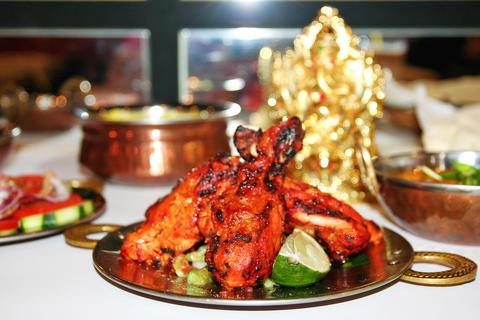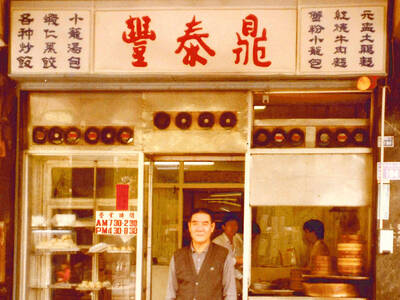It's not an inventive name for a restaurant but Calcutta Indian Food does what it says well. The brother-sister owners are Taiwanese from the West Bengal city and opened the restaurant in Ximending a couple of months ago. Hou Yong-tian (侯勇添) used to be the chef at Spice Shop in Tianmu, so the kitchen has pedigree.
Foreigners, including Indians, form a large portion of the pair's clientele, but locals are being lured in by competitively priced set meals in the week. These range from NT$190 for the vegetarian curry and NT$280 for the lamb, including a salad, soup or drink, nan bread or rice.
Most of the Indian subcontinent's better-known dishes are listed on the menu ("hot and spicy vindaloo," bhuna and madras) but the spicy hot lamb curry mass kolhapuri (a Marathi dish) was a surprise and there is an emphasis on creamy flavors such as pasanda and murgi malai. Side dishes are plentiful and the fiery laccha, a "Delhi-spice salad" is worth trying. Rice is saffron colored and there is a selection of nan breads.

PHOTO: JULES QUARTLY, TAIPEI TIMES
I've visited five or six times and the food has always been of a good standard. It is North Indian in character, according to the owners, tending toward stronger flavors. An example of this was the chicken tandoori, bright orange and baked until it was ever-so-slightly charred. The chicken was good quality and far removed in taste from some of the fake tandooris served up in this city.
Other highlights of previous meals included the iced Darjeeling tea, lemon soda, daal soup and a refreshing homemade milk rice dessert called firni. The channa masala, a chickpea dish with a sweetness balanced by a firm but fair chili kick, come recommended. The raita yogurt is a favorite with many Taiwanese, we were informed, and teased the taste buds. The worst crime as far as Indian food is concerned, is being boring.
The decor will be familiar to lovers of Indian food around the world: Colonial-period, patterned wallpaper in a deep ochre red, a mini chandelier, a few brass fittings and a couple of India-themed pictures. In addition to the usual "fortune cat" (招財貓) waving his paw at the cash desk there is a brass statue of Ganesh the elephant god. Service is informal and friendly.

March 24 to March 30 When Yang Bing-yi (楊秉彝) needed a name for his new cooking oil shop in 1958, he first thought of honoring his previous employer, Heng Tai Fung (恆泰豐). The owner, Wang Yi-fu (王伊夫), had taken care of him over the previous 10 years, shortly after the native of Shanxi Province arrived in Taiwan in 1948 as a penniless 21 year old. His oil supplier was called Din Mei (鼎美), so he simply combined the names. Over the next decade, Yang and his wife Lai Pen-mei (賴盆妹) built up a booming business delivering oil to shops and

The Taipei Times last week reported that the Control Yuan said it had been “left with no choice” but to ask the Constitutional Court to rule on the constitutionality of the central government budget, which left it without a budget. Lost in the outrage over the cuts to defense and to the Constitutional Court were the cuts to the Control Yuan, whose operating budget was slashed by 96 percent. It is unable even to pay its utility bills, and in the press conference it convened on the issue, said that its department directors were paying out of pocket for gasoline

On March 13 President William Lai (賴清德) gave a national security speech noting the 20th year since the passing of China’s Anti-Secession Law (反分裂國家法) in March 2005 that laid the legal groundwork for an invasion of Taiwan. That law, and other subsequent ones, are merely political theater created by the Chinese Communist Party (CCP) to have something to point to so they can claim “we have to do it, it is the law.” The president’s speech was somber and said: “By its actions, China already satisfies the definition of a ‘foreign hostile force’ as provided in the Anti-Infiltration Act, which unlike

Mirror mirror on the wall, what’s the fairest Disney live-action remake of them all? Wait, mirror. Hold on a second. Maybe choosing from the likes of Alice in Wonderland (2010), Mulan (2020) and The Lion King (2019) isn’t such a good idea. Mirror, on second thought, what’s on Netflix? Even the most devoted fans would have to acknowledge that these have not been the most illustrious illustrations of Disney magic. At their best (Pete’s Dragon? Cinderella?) they breathe life into old classics that could use a little updating. At their worst, well, blue Will Smith. Given the rapacious rate of remakes in modern